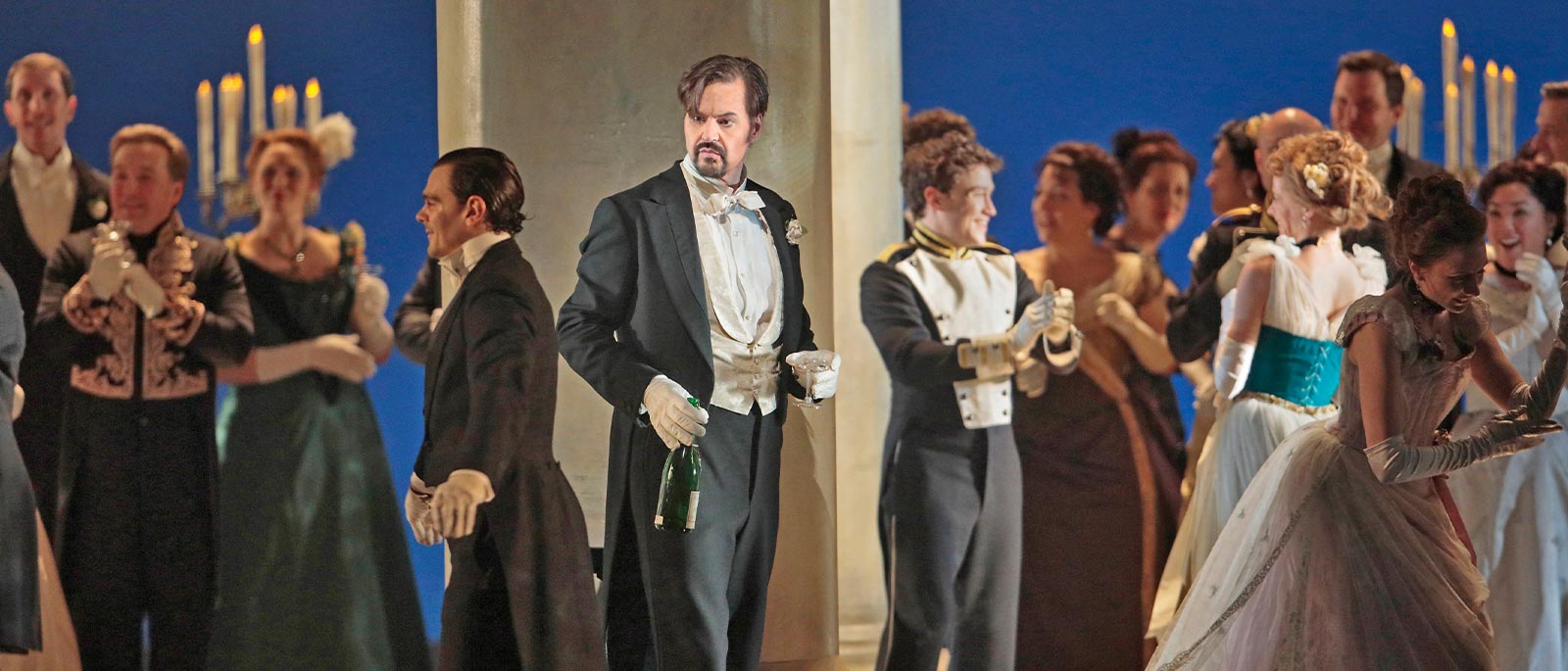
Picturing Onegin
Since his first appearance on the Met stage—as the Count in Le Nozze di Figaro—Peter Mattei has sung 150 performances with the company, becoming one of the Met’s great baritone stars in the process. During the 2016–17 season, which marked the 15th anniversary of his debut, he returned to the title role of Eugene Onegin, opposite the Tatiana of Anna Netrebko. He spoke to Mary Jo Heath about Tchaikovsky’s enigmatic antihero who professes love too late.
You are known as a real singing actor, and I would imagine that the role of Onegin is one that would excite the actor in you.
Not really! He’s difficult. I don’t know if even he himself knows what he’s going to do and how he’s going to behave. He’s so unpredictable—I don’t think he’s human sometimes. I have this idea that if you look at a picture of Onegin, it’s maybe 100 years old, and it’s a little blurry and it’s black and white, and there’s this beautiful young man—but who is he? I think the flesh and blood person is not easy to find. I’ve done the role several times now and he’s still a mystery. But I think that’s the way he has to be. He has to have this kind of picture quality around him. It’s not like singing Don Giovanni or the Count, where you know in your bones and your teeth who they are.
How do you convey that in your performance?
That’s what makes it so difficult to do. I don’t think he’s a whole person somehow. Something is missing in him, something he didn’t get when he was very little or something like that. It’s very difficult to talk about because it’s a kind of private dialogue between me and him, and you have to address it almost without words. When you get the character right, it is a wordless instruction you get from him somehow.
Do you think Onegin is truly in love with Tatiana?
I think he knows somehow that it can never be with Tatiana, and that’s why he goes after her so strongly at the end. But it’s something that happens subconsciously. Inside, he knows it’s too late, he knows he cannot get her—he knows that maybe his life is over. So he goes after her, like in some last supernova, and he feels everything he hasn’t felt. But I don’t think he has the courage to do that if he knew that she might stay with him. But this is just my way of dealing with the character, how he makes sense to me.
Has your approach changed at all with the Met’s Deborah Warner production?
Oh, yes. This is an Onegin I haven’t done before. In other productions he’s been much less a gentlemen somehow. He’s been a little darker, a little more outspoken, and maybe a little crueler. In other productions, there’s been much more of a physical change from the first act to the last. I looked very different. But here, if you look at the costumes and the way I am dressed, it is almost the same as day one. But six years have gone by! So you may look the same, but a lot has happened inside of you. I think that’s the focus in this production, which is very interesting. All the actions are very detailed.
These will be your first Onegins opposite Anna Netrebko. Are you looking forward to working with her?
I always look forward to working with her. We sang Don Giovanni together at the Met, and she was Zerlina, and I was also Marcello to her Musetta in La Bohème. Every time, it has been a pleasure working with her. She is passionate, clever—a true singer. Head, heart, and voice—whatever order you put them in, they’re equally strong with Anna.
I read that after a performance of one of your bigger roles, like Onegin, you like to check on your voice by singing Bach or lieder, something maybe lighter or more intimate. Do you still do this?
Yeah, it is very good—mainly in the shower—to try a folksong or something.
In the shower? I thought it was on the stage!
No, no, no! When you’ve done your business on the stage, the best thing is to get in the shower and hum a folk song by a Swedish composer.
Mary Jo Heath is the Met’s Radio Host.